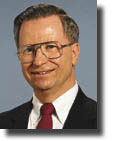
The economics are significant. According to Frederick Seitz, Ph.D., chairman of the George C. Marshall Institute and past president of the National Academy of Sciences, compliance with the Kyoto Protocol would require draconian reductions of roughly 30 percent in the use of fossil fuels in the United States.
George Melloan notes in The Wall Street Journal that the U.S. Department of Energy estimated that reducing carbon dioxide emissions to meet the Kyoto target would cut gross domestic product by $397 billion in 2010 and boost electricity prices by 84 percent. James K. Glassman, a fellow at the American Enterprise Institute, cites a study by economic consultants WEFA Inc. that predicted compliance would reduce the average household income by $2,700 and cost 2.4 million jobs in the United States.
The science does not support Kyoto. Writing in The Wall Street Journal recently, Glassman says strong evidence is emerging that the earth's heating is cyclical, and that the prime mover in warming is the magnetic activity of the sun, as Sallie Baliunas, Harvard astrophysicist and deputy director of the Mount Wilson observatory, has been finding in her research.
And, a paper from the Harvard-Smithsonian Center for Astrophysics concludes "our review of the literature has shown that global climate models are not sufficiently robust to provide an understanding of the potential effects of carbon dioxide on climate necessary for public discussion."
Finally, Kyoto is politically driven, not scientifically driven. Philip Stott, professor of biogeography at the University of London and co-author of Political Ecology: Science, Myth and Power, writes in The Wall Street Journal that "In Europe, global warming has become a necessary myth, a new fundamentalist religion, with the Kyoto Protocol as its articles of faith."
The tension between science and myth characterizes the Third Assessment Report of the U.N.'s Intergovernmental Panel on Climate Change. Stott notes that the whole feel of this report differs between its political summary and the scientific sections. And, he says, it comes as a shock to read in the conclusions to the science summary: "In sum, a strategy must recognize what is possible. In climate research and modeling, we should recognize that we are dealing with a coupled nonlinear system, and therefore that the prediction of a specific future climate is not possible."
It's hard to improve on Stott's assessment: "The idea that we can control a chaotic climate governed by a billion factors through fiddling about with a couple of politically selected gasses is carbon claptrap."